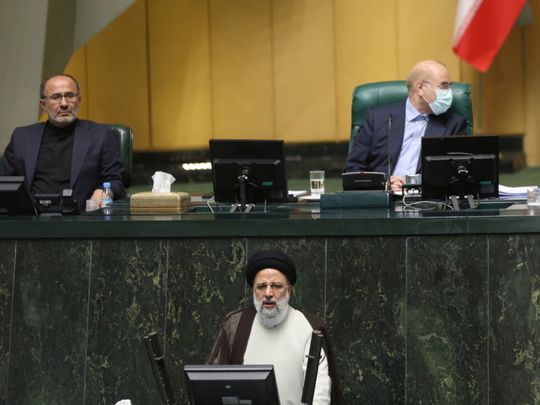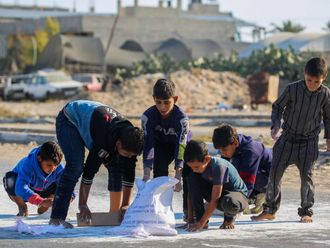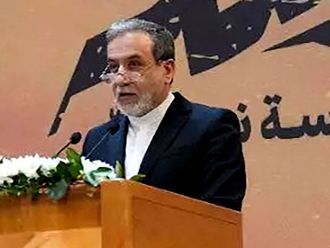
Dubai: Iranian President Ebrahim Raisi on Tuesday appealed for national unity and tried to allay anger against the country’s rulers, even as the anti-government protests that have engulfed the country for weeks continued to spread to universities and high schools.
Raisi acknowledged that the Islamic Republic had “weaknesses and shortcomings,’’ but repeated the official line that the unrest sparked last month by the death of a woman in the custody of the country’s morality police was nothing short of a plot by Iran’s enemies.
“Today the country’s determination is aimed at cooperation to reduce people’s problems,’’ he told a parliament session. ``Unity and national integrity are necessities that render our enemy hopeless.’’
His claims echoed those of Iran’s supreme leader Ayatollah Ali Khamenei, who blamed the United States and Israel, the country’s adversaries, for inciting the unrest in his first remarks on the nationwide protests on Monday. It’s a familiar tactic for Iran’s leaders, who have been mistrustful of Western influence since the 1979 Islamic Revolution and commonly blame domestic problems on foreign enemies without offering evidence.
The hardline Kayhan daily on Tuesday tried to downplay the scale of the movement, saying that “anti-revolutionaries,” or those opposed to the Islamic Republic, “are in the absolute minority, possibly 1 per cent.’’
But another hardline newspaper, the Jomhuri Eslami daily, cast doubt on government claims that foreign countries were to blame for the country’s turmoil.
“Neither foreign enemies nor domestic opposition can take cities into a state of riot without a background of discontent,’’ its editorial read. “The denial of this fact will not help.’’
Iran’s security forces have sought to disperse demonstrations with tear gas, metal pellets, and in some cases live fire, rights groups say. Iran’s state TV reports that violent confrontations between protesters and the police have killed at least 41 people, but human rights groups say the number is much higher.
An escalating crackdown on the press, with dozens of journalists arrested in the last few weeks, has stifled most independent reporting on sensitive issues such as the deaths of protesters.
The recent disappearance and death of a 17-year-old girl in Tehran, however, has unleashed an outpouring of anger on Iranian social media.
Nika Shahkarami, who lived in the capital with her mother, vanished one night last month during the protests in Tehran, her uncle Kianoush Shakarami told the semiofficial Tasnim news agency. She was missing for a week before her lifeless body was found in a Tehran street and was returned to her family, Tasnim reported, adding relatives had not received official word on how she died.
Foreign activists allege she died in police custody, with hundreds circulating her photo and using her name as hashtag online for the protest movement. The prosecutor in the western Lorestan province, Dariush Shahoonvand, denied any wrongdoing by authorities and said was buried in a small village on Monday.
“`Foreign enemies have tried to create a tense and anxious atmosphere after this incident,’’ he told the Hamshari daily, without elaborating on what happened.
As the new academic year began this week, demonstrations spread quickly to university campuses, long considered sanctuaries in times of turmoil. Videos on social media showed students expressing solidarity with peers who had been arrested and calling for the end of the Islamic Republic. Roiled by the unrest, many universities moved classes online this week.
The prestigious Sharif University of Technology in Tehran became a battlefield on Sunday as security forces surrounded the campus from all sides and fired tear gas at protesters who were holed up inside a parking lot, preventing them from leaving. The student union reported that police arrested hundreds of students, although many were later released.
In one video on Monday, students at Tarbiat Modares University in Tehran marched and chanted, “Jailed students must be freed!” In another, students streamed through Khayyam University in the conservative city of Mashhad, shouting, “Sharif University has become a jail! Evin Prison has become a university!’’ — referring to Iran’s notorious prison in Tehran.
Protests also appeared to grip gender-segregated high schools across Iran, where groups of young schoolgirls waved their hijabs and chanted “Woman! Life! Freedom!’’ in the city of Karaj west of the capital and in the Kurdish city of Sanandaj on Monday, according to widely shared footage.












